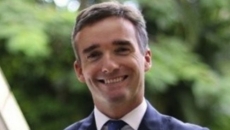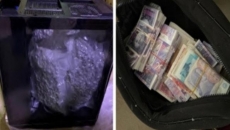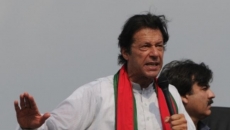The future of United States foreign policy is expected to be the focus of the Republican National Convention on Wednesday as many party faithful call for America to step back from its contributions to the world.
"No NATO. I want America strong," said Kimberly Nguyen, wearing a star-spangled dress and draped in a Trump 2024 flag outside the convention.
"I want America strong."
Wednesday's agenda — and its theme of "Make America Strong Once Again" — will give leaders around the world insight about the potential impact of a second Donald Trump presidency.
Trump, who was officially confirmed as the Republican presidential candidate on Monday, has mused about increased tariffs, been critical of aid to Ukraine and repeatedly claimed he would not defend NATO members that don't meet defence spending targets — of which Canada is one.
During a NATO leaders' summit in Washington last week, Prime Minister Justin Trudeau promised to meet the spending target, which is the equivalent of two per cent of gross domestic product, by 2032.
But he has faced criticism over the lengthy timeline and the lack of detail on how Ottawa will make it happen.
Defence Minister Bill Blair has said the new pledge amounts to about $60 billion a year starting in 2032, but there's been skepticism about how realistic the goal is.
Conservative Leader Pierre Poilievre, who is riding high in the polls, would not commit to the alliance's spending target, saying he doesn't make promises he can't keep.
Trudeau faced a push from provincial leaders to speed up the spending timeline during a premiers' meeting in Halifax earlier on Wednesday.
Manitoba Premier Wab Kinew expressed concerns that failing to meet the target could put Canada's trading relationship with the U.S. in jeopardy — particularly if there's a change in administration.
Outside the Republican convention, there was little empathy for Canada's defence spending delay. Trump supporter Amy Lee said she supports the defensive alliance, but members must meet their commitments.
"Trudeau, we need you to pay your fair share to NATO," Lee said.
All member countries directly contribute the alliance's operations at an agreed-upon formula, and Canada pays its required share of that.
Canada is one of about a dozen members that are not reaching the two per cent of GDP threshold for defence spending, though only seven members, including the U.S., spend more than Canada in real dollars.
Wednesday is also scheduled to be the first opportunity for Trump's running mate JD Vance to introduce himself to the world.
The 39-year-old Ohio senator has built a reputation during his short time in politics for fighting against current U.S. foreign policy and aid to Ukraine.
Vance argued against further funding to the war-ravaged country in a column for the New York Times in April, and told the Munich Security Conference earlier this year that he was there to deliver a "wake-up call" that America's interests must come first.
Trudeau has been one of the most outspoken NATO leaders in support of Ukraine, including at last week's leaders' summit.
Vans with screens on the side were driving around the entrances of the convention in Milwaukee on Wednesday, displaying calls for Republicans to stand with Ukraine.
The Ukrainian Congress Committee of America, which funded the mobile messaging, said that was intended to remind Republicans that standing with Ukraine helps to defeat America's enemies.






